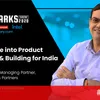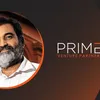As former CEO of Hotstar, Ajit Mohan played a key role in the growth of the OTT platform. Presently, as Vice President and Managing Director Of Facebook India, he is ushering in a new vision for Facebook in India with strategic partnerships.
Before Hotstar, Ajit spent five years in Southeast Asia, with Arthur D. Little, a management consulting firm, and also worked in McKinsey & Company largely for media clients out of New York.
In this episode of Prime Venture Partners Podcasts, Ajit Mohan shares his journey of building Hotstar from scratch, the challenges of understanding Indian consumer behaviour around streaming and more, with Amit Somani, Managing Partner, Prime Venture Partners.
Ajit also throws light on Facebook’s partnership with Jio.
A new leap with Hotstar
In the conversation, Ajit revealed all about building Hotstar way back in 2014 backed by a massively successful and then-largest media house in India, Star.
“Star had become the largest media company in India, with a pan India presence, there was presence in television, movies, and sports. So in many ways, the idea of building a challenger product in Hotstar, which was focused on a product first and not content first,” he says.
“While we benefited from the massive content portfolio of the Star network, we had to build distribution from scratch,” Ajit says, adding, “Most media companies around the world had not embraced technology, or streaming as a core part of their strategy. So, having the wisdom and the courage to create an entity that in many ways could challenge the traditional business - that was innovation.”
Additionally, the culture they maintained inside the company helped Hotstar grow. Ajit says the Hotstar team saw an opportunity to reinvent television rather than merely creating another business vertical for Star.
“It is now a cliched thought that content is king. But we crafted a big shift and made the product managers and the engineers the real heroes. Once we knew who was the real king, hiring talent and recruiting became easier,” he says.
Building distribution channels
Riding on the shoulders of the Star Network, people often assume that Hotstar did not face any challenges when it came to distribution as the parent incumbent had already penetrated the market.
Ajit reveals that distribution channels had to be built from scratch, even though Hotstar had starsports.com as its precursor. He says the roadblock was similar to any other startup. “If you have a mobile app now, how can you make sure that people downloaded the same? We faced this question during distribution as well.”
Despite this challenge, two main things stood out for the app - one, the company was had the backing of a veteran media house. So, they had the required faith in mass consumer marketing. Two, the changing landscape in the Indian market meant people were increasingly being able to afford mobile phones and preferred watching content solo.
“We said that this product is made for you. And there is no need for appointment viewing anymore. I do think the combination of the two helped, but for a tech company, I would say the differentiator was the emphasis on consumer marketing,” says Ajit.
Wooing the Indian consumer
He cites the example of cricket that has become Hotstar’s success mantra. Ajit says there was initial scepticism on this front too.
“Indian consumers may not want to watch cricket on a smaller screen with a 5-minute delayed feed or so we thought since the reality was different. People embraced Hotstar’s model just like their openness to a new e-commerce or food delivery service,” says Ajit.
The second challenge was the cost of data since WiFi is not a ubiquitous luxury in India. “People were so conscious of what they use data for because it was the ticking clock, it was every second every minute in a in a model where data was expensive.”
However, with Jio bringing in the concept of data for all, many telecom operators followed. The anxiety around data usage began diminishing. “The cost of using the internet on the phone plummeted since 2014 and streaming a video now hardly costs money. The Indian consumers are thus increasingly becoming comfortable with the digital ecosystem,” says Ajit.
Ajit also touched on the point where Indians are becoming more willing to pay for subscriptions. And the fact that they no longer view advertisements as disruptions is also helping.
Facebook’s vision and partnership with Jio
Hinged on five pillars, Facebook’s intention in India is the same as the rest of the world – “to play the enabling role to bring about an economic transformation,” says Ajit.
One, the agenda of public expression in sync with India’s democratic ethos. Two, empowering small entrepreneurs working with a team of 5-10 people. Three, seeing WhatsApp as a major payment platform. Four, broad inclusion by eliminating the current gender imbalance on the platform. And five, making India the testbed for product innovation.
Highlight the partnership with Jio, Ajit said, “A lot of us who have lived through the 2015 to 2020 phase, know the particular role Jio played in fueling the digital economy.”
We do not see Jio as a telecom operator. We feel that they are building a platform in India. Together, we look to open new frontiers in the Indian digital space as we are already doing with WhatsApp and Jiomart, he furthers adds, concluding by saying, “the two companies together can fundamentally light up the digital ecosystem. That’s going to be good for India in the long term.”
You can listen to the podcast here.
Edited by Rekha Balakrishnan
Link : https://yourstory.com/2020/10/ajit-mohan-facebook-hotstar-journey
Author :- Anju Ann Mathew ( )
November 01, 2020 at 05:35AM
YourStory


